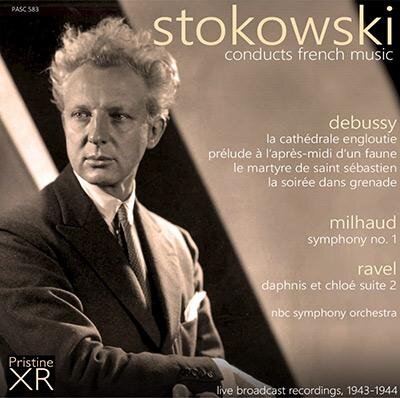Leopold Stokowski was certainly one of the most versatile conductors of the 20th century. His affinities matched his vast repertoire, which ranged from the centuries old to the freshly inked. Though his living composer contemporaries (and critics) may have bristled at the liberties he allowed himself, there is little doubt that his discography preserves a consistently high level of engaging interpretive commitment, not to mention sonic opulence.
A born cosmopolitan, Stokowski was home nearly everywhere in the realm of music, but there were certain corners of the orchestral literature which were especially tailor-made for his talents. This selection of his NBC performances of Debussy, Milhaud, and Ravel, for example, finds him at his opulent best; especially in the shimmering colors of the older two composers, whose post-Wagnerian sensibilities called out to Stokowski’s own.
The NBC Symphony, for all the excellence of its individual members, was not exactly celebrated for the beauty of its corporate sonority. Most of the blame can be laid on the powder dry acoustics of Rockefeller Center’s Studio 8-H, which Stokowski helped to mitigate during his brief tenure at the orchestra’s helm 1941 – 1944. But the ensemble’s fierce loyalty to Toscanini, which made them skeptical of ideas from other conductors, also did not help. Despite those challenges, Stokowski conjured from them playing of spellbinding gorgeousness.
Listeners here are treated to two of his sumptuous orchestrations of Debussy’s piano music—La cathédrale engloutie and La soirée dans Grenade respectively—with the former opening this compilation, followed by the Prélude à l’après-midi d’un faune. A Stokowski favorite, he recorded the score he praised as a “dream world of pagan loveliness” several times. They all follow the same basic interpretive outline, although each has telling details unique to them. This NBC performance from 1944 is no different, boasting a number of retouchings that, while not “faithful” to the score, are undeniably effective. Take a listen to the evocative 3-D effect achieved by the last of the horn calls that echo the opening flute motif, which Stokowski directs to play stopped. Or try his use of chime bars at the coda; very different from the fragile timbre of Debussy’s crotales, but lending a haunting glow to the work’s closing pages.
The present performance of two “symphonic fragments” from Debussy’s incidental music to Le Martyre de saint Sébastien, on the other hand, are the only ones in Stokowski’s discography. They are quite fine, too, if a tad steelier than one would prefer in this ethereal score.
Also making its only appearance on his programs is this New York City premiere performance of Milhaud’s brief Symphony No. 1. Although his catalog of works had already by then swollen into triple-digits—with a number of operas, oratorios, ballets, and string quartets already under his belt—he was a symphonic late-bloomer, not penning his first essay in that form until he was nearly fifty. (Perhaps his friend Honegger’s own Symphony No. 1 from ten years earlier had deterred him.) It is a sprightly, lively work alive with Milhaud’s typical harmonic and rhythmic playfulness, all of which Stokowski does proud in this zestful performance.
Closing is this compilation is an impassioned rendition of the second suite from Ravel’s Daphnis et Chloé, which turns urgent unto hectic in its “Danse générale.” If its finale could have benefitted from a more measured approach, the preceding “Lever du jour” and “Pantomime” are practically erotic desire itself manifested in sound. While some may prefer Stokowski’s later, more relaxed Decca recording, this performance has its own rewards which demand to be heard.
Abetting these performances are the superb remasterings from Pristine’s Andrew Rose, who skillfully imparted the illusion of space around the NBC Symphony. One could imagine the sonic wizardry on these restorations having elicited the approval of Stokowski, himself no stranger to the possibilities afforded by the studio mixing console. Especially benefitting from this are the Prélude à l’après-midi d’un faune and Daphnis et Chloé. Stokowski’s lushly atmospheric stereo recording of the former for Capitol has been my favorite for as long as I can remember, but the sound on this Pristine issue, which markedly improves upon the sound of the Cala transfer from two decades ago, helps carry this performance to the top.
A welcome companion for the languid summer afternoons just around the corner.
Stoki and the NBC get steamy in all-French program from Pristine Audio.

